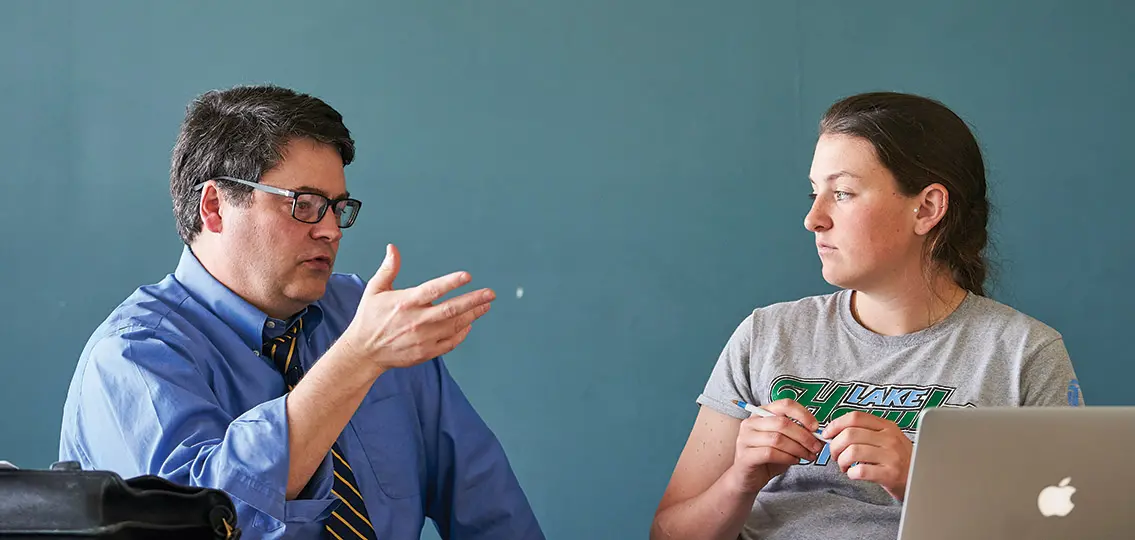As a new school year kicks off, most parents want to know how they can help their teen succeed in college. As a former English professor and first-year student advisor, I have been there and graded that. I’m also the father of two teen daughters, so we’ve discussed many of the scenarios most first-year college students face.

While each college professor is different, knowing how to read similar characteristics can be very beneficial for students. Here are the tips you can pass along to help make your new college student’s experience a success.
5 Ways for College Students to Make the Most Out of Their Relationship With Their Professors:
1. Make sure your teen has an entrance strategy.
As much as possible, your college student should research their classes and professors. For example, they should know the themes of a particular class and which requirements it fulfills, as well as the professor’s background. Most college websites provide research bios for each professor, so make sure your teen takes advantage of them.
This research is not preparation for future flattery or manipulation. Ideally, it may lead to a genuine expression of interest down the road. For example: “Professor X, I saw from your bio that you’re interested in dystopian fiction. So am I. Could we talk about that topic during office hours at some point?”
Tell your teen to avoid stretching the truth about their interests. Instead, look for ways to build bridges that will lead to larger discussions about their major, degree, and career paths.
2. Encourage them to read the syllabus.
Emphasize to your teen the importance of learning the rules, deadlines, and policies of the class—especially concerning things like attendance, cell phones, e-mail, and social media. Understanding basic class guidelines can help make a positive first impression.
Professors write the syllabus very carefully and expect it to be read that way as well. The syllabus usually includes information related to previous issues they may have had with students. Reading the syllabus can help your student avoid potential problems.
3. Suggest they pay attention to classroom dynamics.
Different classes have different dynamics, but generally, class participation will be a part of a your student’s final grade. I recommend the Goldilocks amount of participation for students—not too much, but definitely not too little.
When advising your teen on the right amount of participation, tell them that if they have contributed to a class discussion three consecutive times with no other students speaking, chances are they may be dominating the class. Worse, however, is to never participate in class discussion at all.
Overall, it’s better to err on the side of too much, rather than too little, participation. If shyness is a factor, your student should at least try to show the professor—through eye contact and note-taking—that they are engaged.
4. Remind them to utilize office hours.
The best way for your teen to continue effective communication beyond the classroom is to utilize the professor’s office hours or make occasional appointments. Tell your teen that the majority of professors really do want their students to visit them during office hours to ask relevant questions and review material. In the process, a deeper intellectual connection often develops that can benefit your student in the future.
A freshman year professor might become a reference or someone who writes a letter of recommendation years later. If your student never visits a professor during office hours, the professor only has their grades and faded memories of classroom participation upon which to base a letter. Instead, your teen can build a deeper relationship so their professor remembers their commitment, positive attitude, social skills, and strong work ethic via quality visits during office hours.
5. Ask them to visualize the post-class relationship they want with a professor.
Much like the need for an entrance strategy, your new college student should have an effective exit strategy as a class nears its end. Even though there is a power dynamic between professor and student, in the wider scheme you want your teen to visualize the post-class relationship as one between adults. This means treating each interaction with the growing maturity of a pre-professional.
For example, if your teen has to miss a class due to a family death, by all means they should let the professor know. But if your student “needs” to miss a class due to an anticipated hangover after a Dave Matthews concert (as one student told me), they should keep that to themselves. If your teen is falling behind in the class, recommend they let the professor know as early as possible. Not only does this enable more options to correct course, it also displays a responsible and resourceful mindset.

As a professor, my pet peeve was to have a student ask, “Will this be on the test?” This question sends a clear message that the student views the professor as simply a means to an end, which no one appreciates. It is far better for your teen to view every student-professor relationship, even in classes outside their major, as a potentially lifelong professional association that might one day become mutually beneficial.




